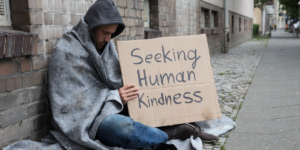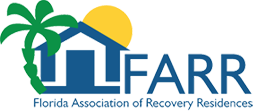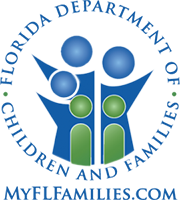The Connection Between Homelessness and Addiction
According to the US Department of Housing and Urban Development, roughly seventeen out of every 10,000 people experience homelessness on any given night in America. Even though the homeless population represents a cross-section of Americans from every region of the country, every family status, every gender, and every racial/ethnic group, the homeless are far too easily dismissed in our society. People whose lives have never been touched by homelessness often assume it’s the result of poor character, lack of judgment, or an unwillingness to work hard.
The negative assumptions and stereotypes around homelessness will sound very familiar to those in the recovery community. Society tends to project the same prejudice onto people struggling with the disease of addiction. Addicts are often disregarded as people who lack self-control and moral character. Both of these populations tend to be invisible communities that people overlook either because they don’t understand or they don’t want to get involved. When a person experiences both homelessness and addiction, they can easily slip even further into the shadows of society.
Unfortunately, a high percentage of homeless people do also struggle with substance abuse and addiction. And homelessness and addiction have a lot more in common as well.
- Both homelessness and addiction are often symptoms of underlying untreated mental health conditions.
- They’re both deeply misunderstood by a society that lacks education and compassion around the complexities that drive them.
- It’s not uncommon for homelessness and addiction to co-occur in a person’s life. Substance abuse can be a cause of homelessness and it can also be a result of it, arising after a person loses their home.
Statistics on Homelessness and Addiction
The Substance Abuse and Mental Health Services Administration (SAMHSA) estimates that:
- 38% of homeless people are dependent on alcohol
- 26% abuse drugs other than alcohol
- Substance abuse is much more common amongst people experiencing homelessness than the general population
Defining “Homelessness”
People often erroneously think of homelessness as a static state and something that defines a person. It’s easy to dismiss the homeless when you imagine that’s what a person has always been and always will be. In reality, homelessness is a circumstance that people from all walks of life can, and do, find themselves in at times. In most cases, homelessness is a temporary state. It is never something that defines a person.
Homelessness is not an easy thing to define or measure. The number of people experiencing homelessness is constantly in flux and therefore difficult to count. There are also varying degrees of homelessness that beg a more nuanced understanding.
People can experience homelessness by being:
- Doubled up: residing temporarily with family or friends
- Sheltered: staying in an emergency shelter or transitional housing
- Unsheltered: sleeping in cars or abandoned buildings, camping outdoors, or living on the streets
Mental Health, Homelessness, and Substance Abuse
There’s a clear correlation between mental health, homelessness, and substance abuse. The relationship between the three is complex and each one can influence, cause, or result from the others.
Mental health conditions are a common underlying cause of both addiction and homelessness. People with untreated mental health disorders like anxiety, depression, bipolar disorder, or PTSD often turn to alcohol and drugs in an attempt to cope. Having a mental health condition also predisposes a person to traumatic life events and the desire to numb painful emotions associated with those events can easily lead to substance abuse and addiction.
The homeless are disproportionately at risk for all health problems, including addiction. According to the Office of National Drug Control Policy, 30% of chronic homeless have serious mental health conditions, and nearly 75% have a substance use disorder or other health conditions.
Untreated mental health conditions may make it difficult to obtain and sustain affordable housing. Recently, COVID-19 precautions and changes in public policy have caused hospitals to discharge patients quickly to ensure adequate hospital beds are available, which can leave some patients with nowhere to go.
The absence of housing puts people at risk of being a victim of crimes including physical and sexual assault, causing even more trauma. Studies have shown that nearly two-thirds of homeless who were surveyed reported struggling with drug or alcohol abuse.
Lastly, addiction is incredibly destabilizing and a major contributing factor to homelessness. Substance abuse disrupts relationships with family and friends and often causes people to lose their jobs. According to a recent study, two-thirds of homeless people reported that drugs and/or alcohol were the cause of their becoming homeless.
Addiction Treatment for People Experiencing Homelessness
A comprehensive approach that treats the whole person is always the most effective treatment for addiction no matter what the person’s circumstances are. To truly overcome addiction, both the underlying causes and the repercussions of addiction must be explored and healed. This means healing trauma, treating physical health problems, diagnosing and treating mental health conditions, providing proper nutrition, mending broken family relationships, establishing stable housing, finding gainful employment, and many many other things.
Effective substance abuse treatment for people experiencing homelessness should include:
- Housing: Access to housing in a stable, safe, and comfortable environment provides a vital foundation for healing and recovery
- Highly Trained Staff: Compassionate experienced staff who can empathize with their clients are an essential part of any successful treatment program
- Comprehensive Treatment: The needs of a person struggling with addiction and homelessness are complex. They require holistic treatment that addresses all aspects of their being.
- Individualized Treatment: A customized treatment plan is always more effective than a one-size-fits-all program.
- Integrated Services: Effective treatment requires addressing co-occurring mental health conditions, physical health, trauma, and much more. A coordinated multidisciplinary approach is essential.
Hope for Those Battling Addiction and Homelessness
At The Source Addiction Treatment Center in Fort Lauderdale, we provide comprehensive holistic treatment catered to the specific needs of each individual we treat. We believe that trauma and untreated mental illness need to be healed for a person to truly recover from the disease of addiction.
We offer a wide range of therapies designed to facilitate healing. Homelessness is a complex issue so we use a multidisciplinary team to provide coordinated care and access to resources.
All of our treatment programs come with the option of residing in one of our beautifully renovated single-family homes located just a mile from the beach.
We’ve made it our mission to place every single person who reaches out to us for help. If we’re not the best fit for you and your needs, we’ll find you a trusted treatment center that is. In our eyes, no one is too far gone and we will never give up on you.
Clients who come to The Source are welcomed wholeheartedly into our family. Most of our staff are in recovery too and we understand how hard it is to make the decision to get help. Our approach is to work with you through the pain, to love you when no one else will, and to guide you to a better life filled with all the joy and happiness you deserve.
If you or someone you love are struggling with addiction, please don’t hesitate to reach out. Our staff is available anytime 24/7 and all calls are confidential. Call (800) 204-0418.

 The Source quite frankly saved my life and got me back on track, never giving giving up on me. When you are thinking about and looking through all of the different places to go for treatment this is the one that should stand out from the rest.
The Source quite frankly saved my life and got me back on track, never giving giving up on me. When you are thinking about and looking through all of the different places to go for treatment this is the one that should stand out from the rest.




























